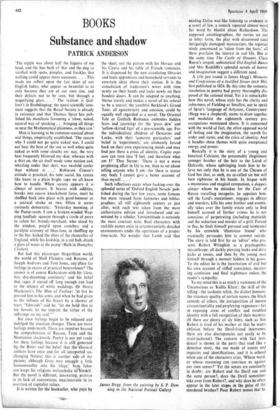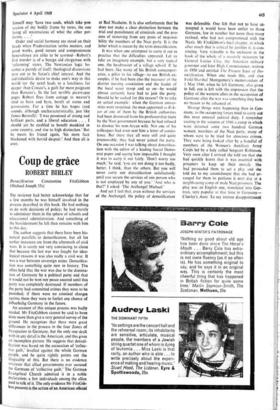Substance and shadow BOOKS
PATRICK ANDERSON
'The nipple was about half the bigness of my head, and the hue both of that and the dug so varified with spots, pimples, and freckles that nothing could appear more nauseous. . . . This made me reflect upon the fair skins of our English ladies, who appear so beautiful to us only because they are of our own size, and their defects not to be seen, but through a magnifying glass. . . .' The realism is Gul- liver's in Brobdingnag; the quasi-scientific Com- ment suggests that the Royal Society is already in existence and that Thomas Sprat has pub- lished his manifesto favouring a 'close, naked, natural way of speaking . .. bringing all things as near the Mathematical plainness, as they can.' Man is learning to be common-sensical about real things, empirically established. 'The reason why I could not go quite naked was, I could not bear the heat of the sun so well when quite naked as with some cloaths on; nay, the very heat frequently blistered my skin; whereas with a shirt on, the air itself made some motion and, whistling under that shirt, was twofold cooler than without it. . . Robinson Crusoe's attitude is practical, his tone social, his syntax like knots in a plain bright rope we all know how to handle. When society appears it is always of interest. It heaves with oddities, breaks into coarse knockabout farce, must be shuffled back into place with goad-humour or a satirical stroke or two. Often it seems curiously democratic: 'Yesterday morning, at the Pump-room, I saw a broken-winded Wap- ping landlady squeeze through a circle of peers to salute her brandy-merchant, who stood by the window, prop'd upon crutches; and a paralytic attorney of Shoe-lane, in shuffling up to the bar, kicked the shins of the chancellor of England, while his lordship, in a cut bob, drank a glass of water at the pump' (Bath in Humphry Clinker).
But had this picaresque Hogarthian world, the world of Moll Flanders and Roxana, of
Joseph Andrews and Tom Jones, any-place for
feelings in excess of practical benevolence? The answer is of course Richardson with his 'close, hot, day-dreaming continuity' and his belief that rapes if staved off long enough can lead to the whitest of white weddings. Or Henry Mackenzie's The Man of Feeling: 'at last he pressed him in his arms, and when he had given to the fullness of his breast by a shower of tears, "Edwards" said he, "let me hold thee to my bosom; let me imprint the virtue of thy sufferings on my soul."'
But once feelings begin to be released and indulged the situation changes. There are more
feelings underneath. There are impulses beyond the comprehension of Reason, Taste and the Newtonian clockwork. Poetry is not yet ready for these feelings because it is still governed by„ the Rules and the belief that the-classical , authors have once and for all interpreted un- changing Nature; this is another side of the
picture; although Gray may smuggle a little homosexuality into his 'elegy,' Saw John- son keeps his religious melancholia tombin-Aelf. But the novel is different, innovating, protean in its lack of conventions, unaristocratic in its assertion of capitalist values.
It is written for the bookseller, who pays by
the sheet, not the patron with his Horace and his Cicero and his table of French romances. It is dispensed by the new circulating libraries and leads apprentices and household servants to entertain ideas above their station. It is the consolation -of tradesmen's wives with time newly on their hands and locks newly on their boudoir doors. It can be adapted to anything. Sterne travels and makes a novel of his refusal to be a tourist; the youthful Beckford's Grand Tour, all egocentricity and emotion, could be equally well regarded as a novel. The Oriental Tale or Gothick Romance embodies hidden fears and yearnings for the 'gross dew' and 'yellow-skirted fays' of a pre-scientific age. For the individualistic children of Descartes and Locke, with their 'concrete particulars' and belief in 'experiments,' are ultimately forced back on their own experiencing minds and may find just there a crisis of identity. Cogito ergo sum can turn into 'I feel, and therefore what am I?' Thus Sterne: 'There is not a more perplexing affair in life to me, than to set about telling anyone who I am—for there is scarce any body I cannot give a better account of than myself. . .
Such reflections occur when looking over the splendid series of 'Oxford English Novels' pub- lished during the last few years, some famous but more rescued from footnotes and biblio- graphies, all still eighteenth century or just after, with each text taken from the most authoritative edition and introduced and an- notated by a scholar. Verisimilitude is certainly the most constant note. Real characters with real-life names exist in circumstantially detailed environments under the operations of a proper time-scale. No wonder that Lamb said that
James Hogg, from the painting by S. P. Den- ning in The National Portrait Gallery reading Defoe was like listening to evidence in A court of law, a remark repeated almost word for word by Hazlitt about Richardson. The supposed autobiographies, the stories set out in letter form, the play with discovered (and intriguingly damaged) manuscripts, the regional study announced as 'taken from the facts,' all these proclaim the interest in real life. But at the same time The Castle of Otranto, Clara Reeve's insipid, unhistorical Old English Baron and Mrs Radcliffe's splendid novels of horror and imagination suggest a different need.
A title just issued is James Hogg's Memoirs and Confessions of a Justified Sinner (ouP 30s), first published in 1824. By this time the romantic revolution in poetry had pretty thoroughly dis- posed of the rational mind. Yet it is remarkable how this novel, whose style has the clarity and robustness of Fielding or Smollett, not to speak of Sprat's 'language of Artyzans, Countrymen' (Hogg was a shepherd), seems to draw together and modulate the eighteenth century pre- occupations mentioned above. It is concerned with the world of fact, the often opposed world of feeling and the imagination, the search for order and status, and the crisis of identity. And it handles these themes with quite exceptional energy and power.
Basically it is the story of a young and fanatical Calvinist, the presumably illegitimate younger brother of the heir to the Laird ' of Dalcastle, whose upbringing leads him to be- lieve not only that he is one of the Chosen of God but that, as such, no so-called sin but will turn righteous in his hands. In league with a mysterious and magical companion, a doppel- Winger whom he mistakes for the Czar of Russia travelling incognito, he appoints him- self the Lord's executioner, engages in affrays and murders, kills his own brother and eventu- ally takes over the family estate only to find himself accused of further crimes he is not conscious of perpetrating (including matricide and the seduction and murder of a girl). Forced to flee, he finds himself pursued and tormented by his erstwhile 'illustrious friend' who eventually persuades him to commit suicide. The story is told first by an 'editor' who pre- sents Robert Wringhim as a psychopathic misanthrope, all darkly piercing looks and dirty kicks at tennis, and then by the young man himself through a memoir hidden in his grave. To the editor he is the incarnation of evil but his own account of stifled conscience, increas- ing confusion and final nightmare enlists the reader's sympathy.
To my mind this is as much a statement of the Unconscious as 'Kubla Khan'; the skill of the telling—the sardonic relish, the dialect humour, the visionary quality of certain scenes, the black comedy of others, the juxtaposition of intense circumstantiality and perplexing vagueness—lies in exposing areas of conflict and troubled identity with a full recognition of their mystery. (If there are plenty of sly hints, such as that Robert is tired of his mother or that he wants oblivion before the Devil-friend intervenes. there are also discrepancies not easily to be strait-jacketed.) The concern with fact (evi- dence) is shown in the parts that read like a detective story, the use made of courts and inquiries and identifications, and it is echoed when one of the characters cries, 'Whose word, or whose reasoning can convince us against our own senses?' Yet the senses are constant/Y in doubt: are Robert and the Devil one and the same person?, does the Devil sometimes take over from Robert?, and why does he often appear in the later stages in the guise of the murdered brother? Poor Robert muses that he himself may 'have two souls, which take pos- session of my bodily frame by turns, the one being all unconscious of what the other per- forms. . .
Order and social harmony are stood on their heads when Predestination settles matters, and good works, good_ nature and compassionate benevolence are alike to be scorned—Robert's first murder is of a benign old clergyman with 'reforming' views. The Newtonian logic be- comes a parody of itself; theological discussions turn out to be Satan's chief interest. And the individualistic desire to make one's way in this world (or the next) leads to a loneliness far deeper than Crusoe's, a guilt far more poignant than Roxana's. In the last terrible picaresque pages Robert flees from cottage to weaver's shed to barn and byre, bereft of status and possessions. For a time he has hopes (and sounds, although uncharacteristically, just like James Boswell): 'I was possessed of strong and brilliant parts, and a liberal education . . . I should yet be enabled to benefit mankind in some country, and rise to high distinction.' But he meets his friend again, 'his stern face blackened with horrid despair.' And then all is over.



































 Previous page
Previous page